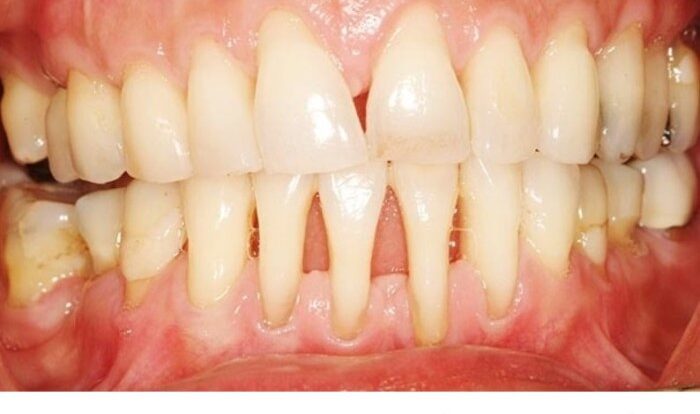
How to cure gum disease without a dentist – Gum disease, a prevalent oral health concern, can be effectively addressed without the need for a dentist. This comprehensive guide explores natural remedies, non-invasive treatments, lifestyle modifications, over-the-counter solutions, and when to seek professional help, empowering you to take control of your gum health.
With a focus on natural and accessible approaches, this guide provides practical advice and evidence-based strategies to combat gum disease effectively.
Home Remedies for Gum Disease
Gum disease, also known as periodontal disease, is a common condition that affects the gums and the bones that support the teeth. It can cause a range of symptoms, including bleeding gums, swelling, and pain. If left untreated, gum disease can lead to tooth loss.
There are a number of natural ingredients that have been shown to have antibacterial and anti-inflammatory properties that may be helpful in treating gum disease. These ingredients can be used to make homemade mouthwashes and rinses that can help to reduce inflammation and kill bacteria.
Natural Ingredients for Gum Disease
- Tea tree oil:Tea tree oil is a natural antiseptic and antibacterial agent that has been shown to be effective in killing the bacteria that cause gum disease. It can be used as a mouthwash or applied directly to the gums.
- Green tea:Green tea contains polyphenols, which are antioxidants that have been shown to have anti-inflammatory and antibacterial properties. Green tea can be used as a mouthwash or applied directly to the gums.
- Aloe vera:Aloe vera is a natural anti-inflammatory agent that can help to reduce swelling and pain in the gums. It can be used as a mouthwash or applied directly to the gums.
- Baking soda:Baking soda is a natural alkaline agent that can help to neutralize the acids in the mouth that can contribute to gum disease. It can be used as a mouthwash or applied directly to the gums.
- Salt:Salt is a natural antiseptic and antibacterial agent that can help to kill bacteria and reduce inflammation in the gums. It can be used as a mouthwash or applied directly to the gums.
Homemade Mouthwashes and Rinses
To make a homemade mouthwash or rinse, simply combine one or more of the above ingredients with water. You can also add a few drops of essential oil, such as peppermint or eucalyptus, for flavor and added antibacterial benefits.
Gum disease is a common problem that can lead to serious health issues if left untreated. While it’s important to see a dentist for regular checkups and cleanings, there are also some things you can do at home to help prevent and treat gum disease.
Here are a few tips that may help you cure gum disease without a dentist.
To use a homemade mouthwash or rinse, simply swish it around your mouth for 30 seconds to 1 minute, then spit it out. You can use a homemade mouthwash or rinse several times a day, as needed.
Non-Invasive Treatments

Alternative therapies offer a non-surgical, antibiotic-free approach to improving gum health. These treatments aim to reduce inflammation and promote tissue regeneration.
For those looking for an alternative to traditional dental treatments, there are several natural remedies that can help alleviate gum disease symptoms. From salt water rinses to herbal mouthwashes, there are a variety of options to consider. How to cure gum disease without a dentist provides detailed instructions and tips on using these natural remedies effectively.
With consistent use, these methods can help reduce inflammation, improve gum health, and prevent further damage.
Oil Pulling
Oil pulling involves swishing a tablespoon of oil (such as coconut or sesame oil) in the mouth for 15-20 minutes. This helps remove bacteria and toxins, reducing inflammation and improving gum health.
Laser Therapy
Laser therapy uses low-level lasers to stimulate tissue regeneration and reduce inflammation. The laser’s energy penetrates the gums, promoting blood flow and healing.
Ozone Therapy
Ozone therapy involves exposing the gums to ozone gas, which has antibacterial and anti-inflammatory properties. It helps kill bacteria and promote tissue repair.
Lifestyle Modifications: How To Cure Gum Disease Without A Dentist

Lifestyle modifications play a crucial role in combating gum disease. Adopting healthy habits like maintaining good oral hygiene, quitting smoking, and managing stress can significantly contribute to improving gum health and preventing further damage.
Let’s delve into the specific lifestyle changes that can make a positive impact on your gum health:
Oral Hygiene Practices, How to cure gum disease without a dentist
- Brushing:Brush your teeth at least twice a day with a soft-bristled toothbrush and fluoride toothpaste. Brush gently along the gum line and the surfaces of your teeth.
- Flossing:Flossing daily helps remove plaque and food particles from between your teeth, where your toothbrush can’t reach. Floss gently to avoid damaging your gums.
- Mouthwash:Use an antibacterial mouthwash to kill bacteria and reduce inflammation in your gums. Choose a mouthwash that contains fluoride to strengthen your teeth.
Smoking Cessation
Smoking is a major risk factor for gum disease. The chemicals in cigarettes damage the gums and weaken the immune system, making it harder for your body to fight off infection. Quitting smoking can significantly improve your gum health and overall health.
Stress Management
Chronic stress can contribute to gum disease by suppressing the immune system and increasing inflammation in the body. Find healthy ways to manage stress, such as exercise, meditation, or yoga. Reducing stress can help improve your overall health, including the health of your gums.
Healthy Diet
Eating a healthy diet is essential for overall health, including gum health. Include plenty of fruits, vegetables, and whole grains in your diet. These foods are rich in vitamins, minerals, and antioxidants that support gum tissue regeneration and strengthen the immune system.
Over-the-Counter Treatments
Over-the-counter (OTC) treatments can help alleviate gum disease symptoms and support oral hygiene. These products contain active ingredients that target inflammation and bacterial growth.
If you’re looking for ways to cure gum disease without a dentist, you’re in luck. There are a few things you can do to help improve your gum health and prevent gum disease. How to cure gum disease without a dentist is a great resource for learning more about gum disease and how to treat it.
Choosing Effective OTC Treatments
The effectiveness of OTC treatments depends on individual needs and the severity of gum disease. Consider the following factors when selecting a product:
- Active Ingredients:Look for products containing ingredients like chlorhexidine, triclosan, or cetylpyridinium chloride, which have antibacterial and anti-inflammatory properties.
- Form:OTC treatments come in various forms, including mouthwashes, gels, and toothpastes. Choose a form that is convenient and comfortable for you to use regularly.
- Dosage:Follow the instructions on the product label carefully for the recommended dosage and frequency of use.
- Consultation:If you have severe gum disease or underlying health conditions, consult a healthcare professional before using OTC treatments.
When to Seek Professional Help

While home remedies and lifestyle modifications can alleviate mild gum disease symptoms, it’s crucial to seek professional dental intervention if the condition persists or worsens. Specific signs and symptoms indicate the need for a dental checkup and treatment.
If you experience any of the following, schedule a dental appointment promptly:
Signs and Symptoms Requiring Professional Help
- Persistent bleeding gums, even with gentle brushing or flossing
- Receding gums, exposing the roots of your teeth
- Loose or shifting teeth
- Pus or discharge from the gums
- Severe pain or discomfort in the gums
- Swollen or puffy gums
- Bad breath or a persistent metallic taste in the mouth
These signs and symptoms indicate advanced gum disease that requires professional treatment. Delaying dental care can lead to irreversible damage to your gums and teeth.
Types of Dental Treatments for Gum Disease
Depending on the severity of your gum disease, your dentist may recommend various treatment options:
- Scaling and Root Planing:A deep cleaning procedure that removes plaque and tartar from the teeth and root surfaces.
- Periodontal Surgery:Involves lifting the gums to remove infected tissue and bone, and reattaching the gums to the teeth.
- Laser Therapy:Uses a laser to kill bacteria and promote tissue regeneration.
Your dentist will assess your individual needs and determine the most appropriate treatment plan for your gum disease.
Last Point
By incorporating these simple yet effective measures into your routine, you can significantly improve your gum health, prevent further damage, and maintain a radiant smile. Remember, consistency and attention to oral hygiene are key to long-term success. If symptoms persist or worsen, do not hesitate to consult a dental professional for further evaluation and treatment.
Answers to Common Questions
Can I use salt water to treat gum disease?
Yes, salt water has antibacterial properties that can help reduce inflammation and kill bacteria in the mouth. Dissolve half a teaspoon of salt in a cup of warm water and rinse your mouth for 30 seconds.
Is oil pulling effective for gum disease?
Oil pulling, the practice of swishing oil in the mouth for 15-20 minutes, has been shown to reduce plaque and bacteria, which can contribute to gum disease. Coconut oil or sesame oil are commonly used.
How can I prevent gum disease?
Regular brushing and flossing, along with avoiding sugary foods and drinks, are essential for preventing gum disease. Quitting smoking and reducing stress also contribute to better gum health.





